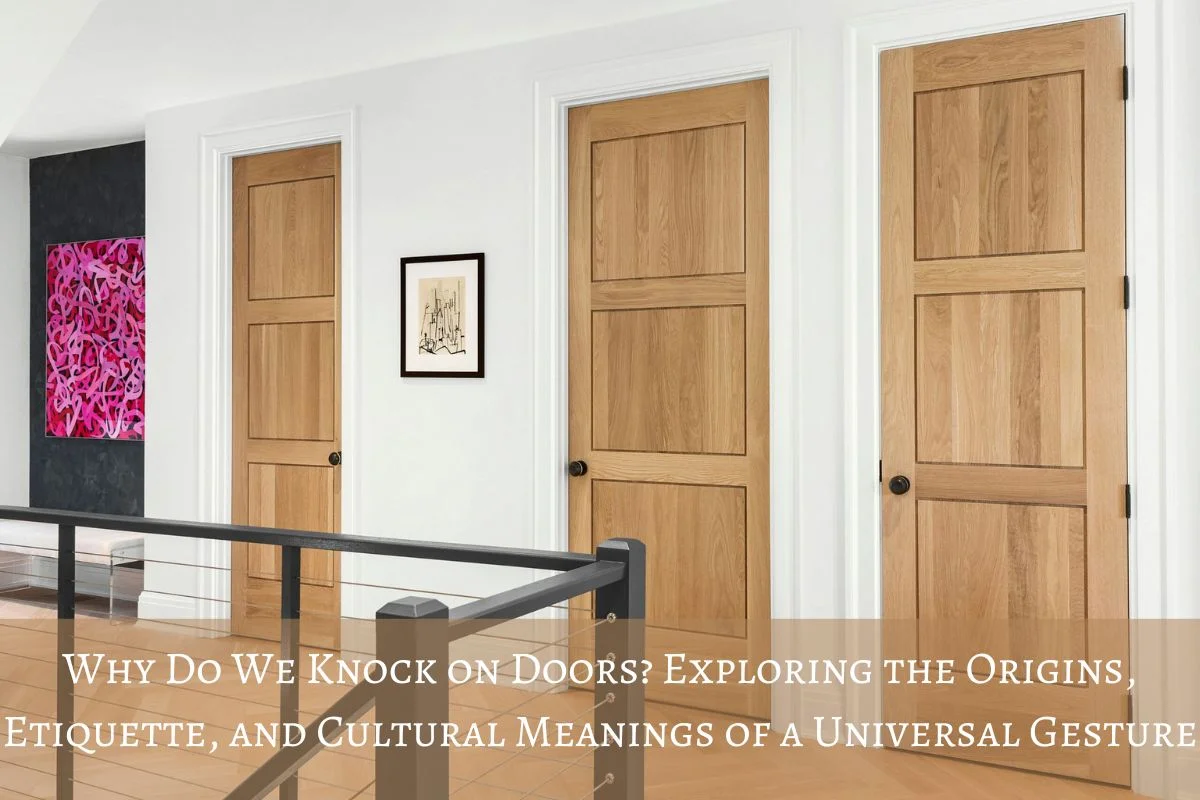
Knocking on doors is a simple, almost instinctive action that many of us do without a second thought. Whether we’re visiting friends, entering an office, or checking on a neighbor, the sound of a knock carries with it a sense of anticipation and respect. But have you ever stopped to wonder: why do we knock on doors? This seemingly small gesture has deep roots in history, culture, and etiquette, and its meaning has evolved across different societies and contexts. From ancient customs to modern-day practices, knocking on doors symbolizes more than just an entrance—it’s a way of communicating with others, signaling both respect for privacy and a desire for connection. In this exploration, we’ll dive into the fascinating origins of door-knocking, the etiquette that governs it, and the diverse cultural meanings attached to this everyday ritual. So, the next time you raise your hand to knock, take a moment to reflect on the rich history behind this universal gesture.
Historical Origins of Knocking on Doors
Knocking on doors has ancient roots, with its origins traced back to early human societies. In ancient Rome, the knock served as a form of announcing one’s presence, as homes had limited privacy. During medieval times, it was a ritualized form of communication, often associated with the entrance of important guests or during religious ceremonies. Knocking was a way of signaling intention, ensuring both parties knew that a meeting was about to take place, thus giving the person inside time to prepare or accept the visitor, reflecting early forms of respect and protocol.
The Art of Knocking: Navigating Etiquette and Social Norms
In different societies, door-knocking etiquette can vary significantly. Traditionally, the number of knocks and their intensity often signaled the purpose of the visit. A gentle knock might be used for a friendly, casual call, while a series of firm knocks could indicate urgency or a formal visit. Knocking was also used to avoid startling the inhabitants or invading their privacy. Social norms also determined whether a woman, for example, would knock differently than a man, or how different classes and statuses approached the act of knocking, with the more privileged perhaps given greater freedom to enter.
Knocking Around the World: The Diverse Cultural Meanings Behind a Universal Gesture
Across cultures, the significance of knocking on doors differs. In many Western cultures, it’s a standard sign of respect for privacy, symbolizing both politeness and a boundary between personal space and public interaction. In Asian cultures, knocking is equally important, though there may be variations in the manner (e.g., softer knocks or specific rituals). In some African cultures, knocking may carry even deeper spiritual meaning, as it can be seen as a way to communicate with ancestors or spirits. These variations highlight how universal yet deeply rooted door-knocking practices are in global traditions.
More Than a Sound: The Deep Symbolism and Hidden Meaning Behind Every Knock
Knocking on a door is more than just a physical act; it carries a symbolic weight. It often represents respect for privacy and the boundaries of others, a gesture indicating the desire to engage without forceful intrusion. Metaphorically, a knock on the door can symbolize the opening of new opportunities or experiences, such as a career change or personal growth. In literature and art, a knock can also signal change, a new chapter, or an invitation to something unknown. This deep, symbolic meaning connects this everyday act to larger themes of anticipation, permission, and communication.
From Knock to Ring: How Door-Knocking Has Evolved in the Digital Age
With the advent of technology, traditional door-knocking has evolved. The modern doorbell, intercom, and smartphone notifications have replaced the knock, making it easier and more efficient to announce one’s presence. While these technological advancements offer convenience, they also alter the personal interaction involved in knocking. The knock, with its distinct rhythm and sound, creates an immediate connection between the person knocking and the one receiving. In today’s world, knocking might seem old-fashioned, yet it remains a vital, human gesture, representing the timeless desire for direct, face-to-face communication in an increasingly digital world.
The Many Faces of Knocking: Understanding Its Role in Different Contexts
Knocking takes on different meanings depending on the context. In a professional setting, knocking before entering an office shows respect for the privacy of colleagues or bosses. It’s also a way of signaling one’s arrival without interrupting ongoing activities. In homes, knocking is a sign of goodwill and courtesy, showing respect for the personal space of the inhabitants. Knocking during social gatherings or meetings might also indicate a greeting or a reminder of one’s presence. Understanding the appropriate context for knocking is crucial, as it sets the tone for the interaction that follows.
The Knock That Echoes: Unraveling the Psychological Impact of Door-Knocking
The simple act of knocking can evoke a variety of psychological responses. For the person doing the knocking, there may be feelings of anticipation, excitement, or even anxiety, especially when entering unfamiliar territory or seeking an important conversation. For the person receiving the knock, it often triggers curiosity, prompting them to wonder who is at the door and what they want. The sound of a knock can create a sense of tension or urgency, signaling that something important is about to happen, while also providing a moment of pause to mentally prepare for the encounter.
The Knock on the Door: Will Tradition Fade or Evolve in the Digital Age?
With the rise of smart home technology and digital communication, traditional knocking may eventually fade away. Smart doorbells with video feeds and apps allow individuals to communicate with visitors without ever hearing a knock. As society continues to prioritize speed and efficiency, the personal touch of knocking could be seen as outdated. However, despite these advancements, knocking remains an enduring symbol of personal interaction, and it’s likely that it will never fully disappear. Instead, it may evolve, becoming a more symbolic act tied to moments of emotional significance, like announcing the arrival of a guest or opportunity.
Conclusion
In conclusion, knocking on doors is far more than just a simple action—it’s a practice steeped in history, culture, and social significance. From its ancient origins to its role in modern etiquette, the act of knocking reflects a deep respect for privacy, boundaries, and human connection. While technology may be changing the way we communicate, the symbolism and emotional weight behind knocking ensure it remains relevant in our lives. Whether it’s an invitation to engage, a call for respect, or a metaphor for new opportunities, knocking continues to bridge the gap between people and the spaces they inhabit.


